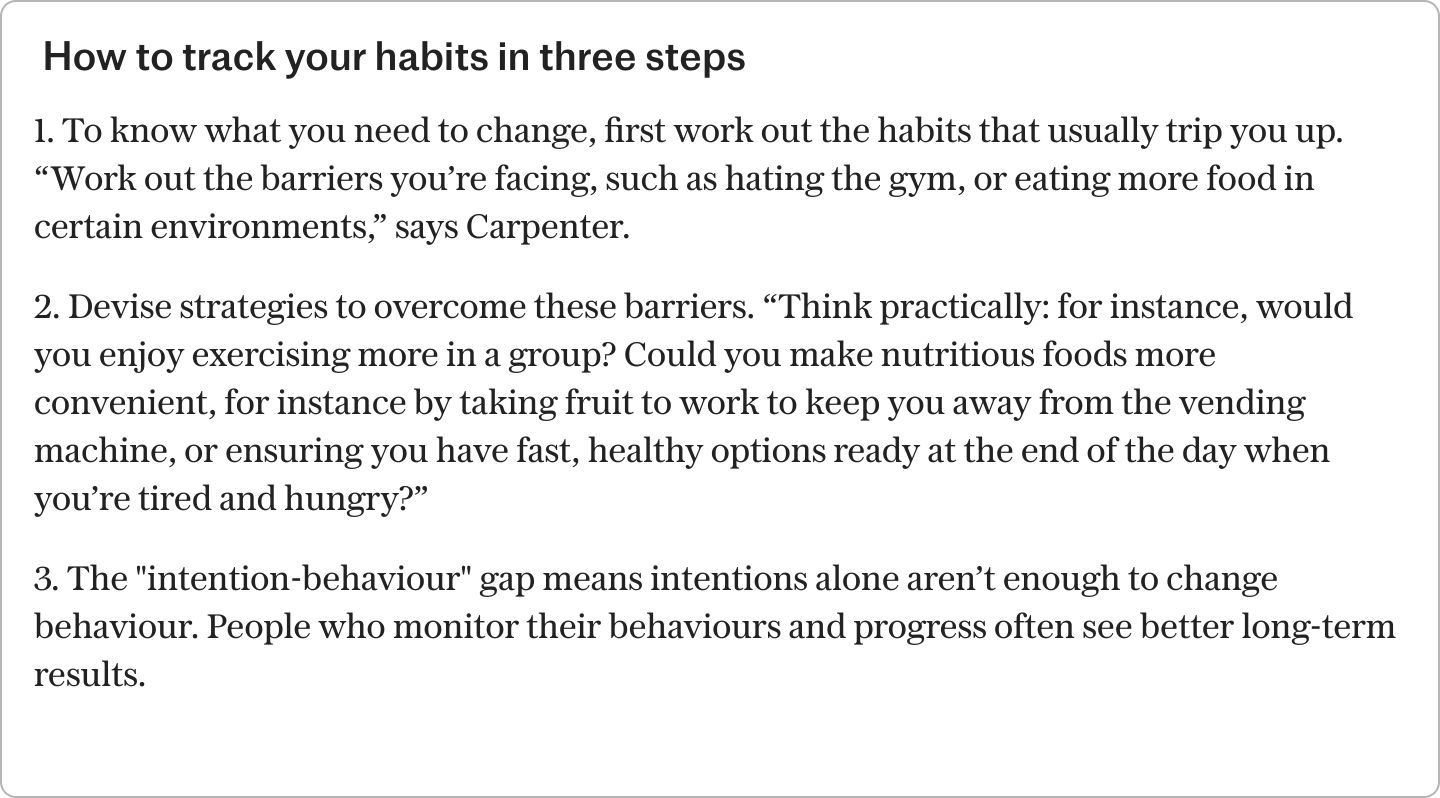Eight new health habits that are better than a diet

As a young personal trainer, Ben Carpenter noticed a growing tide of misleading information about diet and exercise spreading across social media. Feeling a sense of obligation to counter it, he started making videos to challenge these claims and explain what the actual science supports.
Fifteen years down the line, he now boasts an avid, 500,000-strong following on Instagram, who depend on his combination of hands-on, evidence-based guidance and a non-condemning attitude to aid their weight loss efforts.
And make no mistake, it really is this – weight loss – that the majority of his clients and followers are after. "My entire career, it's always been people's number-one goal," explains the 37-year-old – a Brit who now lives in California with his wife Sohee, a fellow fitness trainer.
After carrying out thorough research on the topic, he came to the conclusion that diets are ineffective. 'Around half of all adults are continuously trying to shed pounds every year, yet obesity rates are actually rising,' he notes. 'A vast amount of scientific evidence has demonstrated that although individuals do tend to lose weight fairly easily in the short term through dieting, nearly all of it is usually regained.'
But we also begin to use less energy.
to help us ditch dieting for good – but still shed almost 7 kilograms in the next 12 months. “You can achieve lasting weight reduction, but you need to move your focus away from dieting,” he says.
As you said, fitness hasn't always been straightforward. He suffers from Crohn's disease, a long-term condition that causes inflammation in the bowel, and manages it with treatment. However, during a period of poor health in his twenties, his weight dropped to around 9 stone and he was unable to carry out his daily activities for several months.
He tells of how he was in such a poor state of health that he couldn’t even walk to the loo without someone’s assistance, which has given him a deeper understanding and empathy for those who genuinely struggle with physical fitness.
A significant part of Carpenter's appeal lies in his refusal to lay blame on individuals struggling with their weight. "It's not laziness, or a lack of willpower – it's a combination of complex factors, including genetics, the food industry, and the messages we've all internalised from diet culture."
We're led to think of dieting and exercise as temporary, unwelcome routines: brief periods of denial, where we restrict ourselves excessively, before reverting to our usual ways of living.

Making a series of small but significant changes to our daily routines, which, as they accumulate, have a tangible and lasting effect.
"He says willpower is overstated, 'You can't motivate yourself to do something you don't want to do, like going to the gym when you're knackered after work.'
Instead, he suggests we make a few straightforward actions a regular part of our routine. "As you get more practice in, they should become second nature and require less conscious effort to stick to – they're not things you dread, they're just part of your day," he says. "At that point, you can introduce another habit, if you wish.
Begin with a self-assessment. “Take a thorough look at your current eating habits and the level of physical activity you're doing, and consider what you would like to change,” says Carpenter.
Rather than setting a large and distant goal, such as "lose a stone", focus instead on more precise actions that will help you achieve it, such as "eating more fruit and vegetables". Select a handful of daily habits from the following that appeal to you personally, are realistic for you to implement, and are powerful enough to help you reach your goal if adopted consistently.
Actually, the goal isn’t to try to do everything: “In the context of weight loss, a majority of your results can come from a surprisingly short list of behavioural changes,” he says.
Prioritise nutritious, low-energy-density foods
To lose weight, we need to eat less high-calorie food, but Carpenter recommends focusing on "what you can eat more of, rather than what you need to eat less of" to avoid obsessing over the latter.
"Eating more nutritious, lower-processed food can be "quite possibly the most important habit you can achieve which will aid fat loss," he says.
A simple place to start is by consuming more fruit and vegetables. In the UK, just 32.5 per cent of the population eat the recommended five portions every day, but substituting some of the other food you eat with fruit and vegetables is a straightforward way to lower your overall energy intake without having to count calories.
to reduce how much people eat at the main course by an average of 12%. Carpenter usually eats a bowl of crudites, like baby tomatoes, while he's cooking dinner, and adds finely chopped or blended vegetables into sauces.
2. Eat protein at breakfast
Consuming greater amounts of protein can aid in management of weight loss, as well as satisfy our hunger and regulate blood sugar levels, resulting in reduced likelihood of consuming unhealthy snacks.
Research has discovered that serving teenagers high-protein breakfasts such as omelettes results in them feeling significantly less hungry compared to eating a breakfast consisting mainly of carbs and sugar, like oatmeal with sugar. In one notable instance, they consumed 81 per cent more food at their next meal after eating oatmeal with sugar.
Therefore, it stands to reason that beginning one's day with a protein-rich meal, such as eggs or yoghurt, is a beneficial start.
3. Be aware of fat
Not all types of dietary fat are detrimental – avocados, nuts and olive oil are actually beneficial. However, Carpenter notes that it is very simple to ingest excessive amounts without even realising it. In the UK, the majority of adults consume too much saturated fat through products such as biscuits, cakes, pastries and red meat.
Grilling meat rather than frying it, reducing extra fat by trimming it off, consuming smaller portions of sauces like mayonnaise, and choosing leaner proteins such as chicken and fish are all straightforward habit modifications. "You'll be amazed at how straightforward it is to make a few small changes that add up to considerable reductions if you're making them a lot," says Carpenter.
There is no text to paraphrase. Please provide the text.
We are consuming more calories from drink than previously – perhaps not surprising, given that blended coffees with milk and sugar can be around 200 calories.
Consuming sugar from liquids has less satiating effect than consuming the same amount in solid form, which means drinks with added sugars are usually high-calorie extras on top of our regular meals. Drinking many sugary drinks is consistently linked to weight gain and poorer health outcomes.
Mr Carpenter advises drinking water whenever possible, and suggests diluting sugary drinks such as fruit juice, with the option of opting for reduced-calorie versions of fizzy drinks if you cannot abstain from them altogether.
5. Boost your daily routine with regular physical activity
“Most people fail to appreciate that their body consumes more energy in basic day-to-day activities than it does during a typical exercise routine,” says Carpenter.

The main source of the energy we expend is referred to as non-exercise activity thermogenesis, or NEAT, which encompasses all movement outside of planned exercise. Research is increasingly indicating that this activity in our daily routines is the key to maintaining a healthy weight.
“Add more activity into your daily routine – make use of a standing desk, take calls while standing up and opt for the stairs instead of the escalator,” he says.
6. Take exercise snacks
As recommended by the NHS, it is at least 150 minutes of moderate-intensity activity per week.
The good news is there's a growing body of research uncovering the advantages of exercise snacking, or short bursts of activity – 10 minutes a day of which could add almost two years to our lives, according to the researchers.
I am a strong advocate for exercise snacking," says Carpenter. "Combining short periods of activity with things you normally do on a daily basis, like waiting for your coffee to finish brewing, can really help you develop a lasting habit.
In our increasingly inactive lives, it's proving difficult to hit the recommended target of 10,000 steps per day, “but research indicates that even taking a few more steps daily can significantly decrease the risk of an earlier death,” he says. Every little counts.
7. Sleep well
Lack of good quality sleep can affect your body weight, as sleep deprivation can cause hormonal fluctuations that make us feel more inclined to eat.
Following just one night without a full night's rest, those who had only four hours' sleep instead of the usual eight had eaten 559 more calories the next day.
By nearly an hour each night, naturally they consumed 270 fewer calories as compared to those who continued with their usual sleeping habits.
He says that making sleep a priority will help regulate your appetite, improve your diet and increase fat loss,
8. Eat regularly, without taking your attention away from your meal.
"Maintaining a consistent eating schedule can aid in reducing our tendency to snack between meals," says Carpenter.
Maintaining a consistent eating pattern is also crucial: a study found that individuals who dieted fairly steadily all throughout the week were more likely to sustain their weight loss than those who followed a stricter diet during the week and then eased up at weekends.
Distractions while eating, such as watching television, can interfere with the body's natural sense of satiety, so it's advisable to eat without these distractions. Certain research has also established a correlation between how quickly one consumes their food and the risk of obesity, so "slowing down your eating by taking more time to chew and putting down your cutlery between bites is a sensible approach".
It's a good idea to make a to-do list at the start of every day, and jot down the habits you want to make a part of your routine, so 'a 15-minute walk' for example," he says. "Crossing it off gives you a little sense of satisfaction, and putting it in writing helps you see what's working and stay motivated.

Extract from: Fat Loss Habits, Diets Don’t Work, Habits Do, The No-Holds-Barred Guide to Weight Loss, By Ben Carpenter, Octopus Publishing, £16.99.
Recommended
Ways to Slash 300 Calories from Your Daily Intake this January
Read more
Enjoy The Telegraph's comprehensive collection of Puzzles - and begin each day feeling more cheerful. Sharpen your mind and elevate your mood with PlusWord, the Mini Crossword, the challenging Killer Sudoku and even the traditional Cryptic Crossword.
Posting Komentar